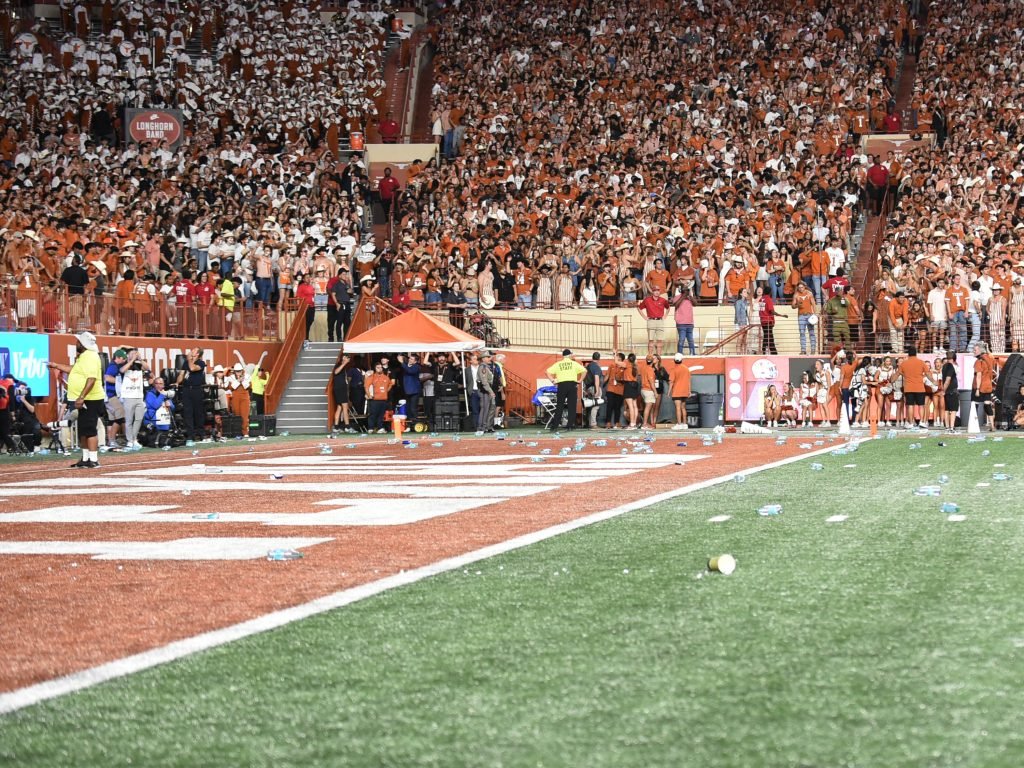
Everyone in the stadium at Texas Tech’s loss to Colorado on Saturday would have understood why Tech head coach Joey McGuire took it upon himself to seize a microphone and begin yelling at the home fans near the beginning of the fourth quarter. They would have seen what people watching at home did not, which was those fans throwing a bunch of garbage from the seats and onto the field while officials reviewed a Colorado sack that involved both a facemask penalty that was not called and a targeting infraction that first was, and then was overturned. While Dean Blandino explained to the TV audience what was happening, his traditional more-in-sorrow-than-in-anger tone was overtaken by something that sounded more like a Muppet that had been stuffed into a dryer against its will. That was McGuire, and he wanted everyone to knock it off.
There was a lot to admire in McGuire’s interruption—the comic timing, the unexpected but impressive multi-octave range he demonstrated, the fact that he remembered to say “please” at the end—but only the coach’s vocal virtuosity really qualified as new. In a week that had something like the usual quantum of upsets and upheaval, the fact that fans tossed a bunch of trash onto the field was similarly par for the course. Later on Saturday, LSU fans responded to a facemask that overturned a Tigers sack by throwing a bunch of garbage into their own end zone, then did so again—”not as much as the first time,” AL.com’s Nick Kelly noted—a few minutes later. “If I were our fans, I wouldn’t be happy,” LSU coach Brian Kelly said after the game, a lopsided home loss to Alabama. “I’m not advocating that you throw anything on the field. I think it’s like any venue, I think you should use good judgment, but I wouldn’t be happy if I was watching us play.”
It is a remarkable thing for a football coach to lose a game badly enough that he won’t completely disavow fans decision to throw garbage at him, and only slightly less remarkable that this bit of uncivil disobedience has become common enough to qualify as a trend. “Why has that had to become a thing this year?” ABC’s Kirk Herbstreit wondered as the trash flew at LSU, in tones of dismay that can best be described as Herbstreitian. “Some idiots do this at Texas and now all of a sudden we see it popping up in college football. Enough’s enough, clowns.”
If Herbstreit sounded exasperated, it was mostly because he always just sort of sounds like that. But also he was there when Some Idiots Did That At Texas, and so probably had at least some idea. When home fans began throwing what ABC’s Rece Davis described as “hundreds of water bottles” into the end zone after a defensive pass interference call overturned a Longhorns interception on October 19, Texas coach Steve Sarkisian was forced into a similar role to the one McGuire seized on Saturday, although Sarkisian chose to play it by removing his headset, looking pained, and giving fans the classic two-palm “please stop throwing hundreds of water bottles into the end zone” gesture. The officials huddled while cheerleaders and staffers got to work cleaning up the field; when the officials overturned what was not by rights a reviewable call, the Texas fans were very nearly as loud but littered notably less.
Some bitter lore has sprung up around this particular garbage-throwing incident, seemingly because the call wound up being overturned. In his write-up of the Baton Rouge Trash Incident, Saturday Down South’s Derek Peterson wrote that “fans in Austin successfully overturned a questionable pass interference penalty in the game between Texas and Georgia by throwing trash onto the field and delaying the game.” That is a very college football way of expressing it, and too funny to disavow entirely for that reason. Still, it feels like something of a stretch to suggest that there’s some sort of broader strategic calculation behind a bunch of juiced-up college dudes with FBS hairstyles throwing garbage when things aren’t going well for their football team. Herbstreit’s exasperation, in this case, is easy enough to understand. His professed confusion is much less easy to credit. The final score of the game he was calling was 42-13, in favor of the visitors. The rest, give or take the details, is a matter of gravity.








